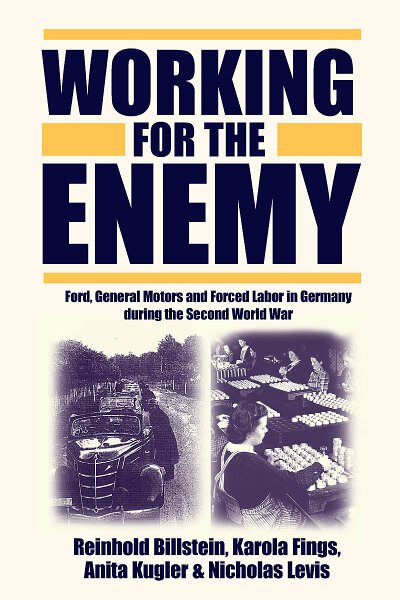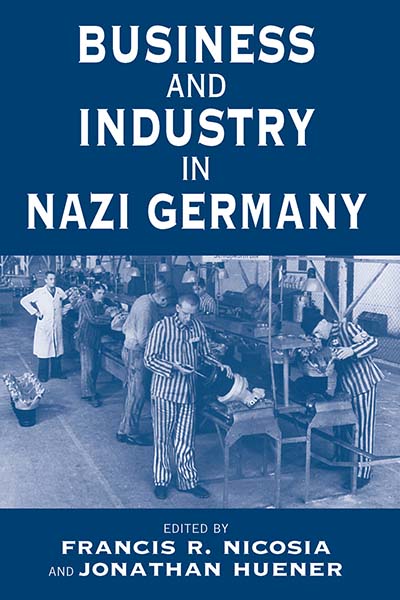
See Related
History JournalsEmail Newsletters
Sign up for our email newsletters to get customized updates on new Berghahn publications.
Working for the Enemy
Ford, General Motors, and Forced Labor in Germany during the Second World War
Reinhold Billstein, Karola Fings, Anita Kugler and Nicholas Levis
Edited by Nicholas Levis
352 pages, 49 illus., 2 maps and 5 tables, bibliog., index
ISBN 978-1-84545-013-7 $34.95/£27.95 / Pb / Published (November 2004)
eISBN 978-1-78238-785-5 eBook
Reviews
CHOICE OUTSTANDING ACADEMIC BOOK OF THE YEAR 2001
"This well-selected anthology ... ranges from analytical articles to interviews with people conscripted into the forced labor pool ... This is a vital supplement for students of the era or anyone wrestling with the legal and moral debates regarding restitution and repayment for involuntary work." · CHOICE
"How fortunate for me to find out about Working for the Enemy ... Impeccable scholarship, perfectly-made case, fascinating research - I commend you and your dedicated colleagues." · Dr. Neil Baldwin
"By carefully examining the automotive companies' collaboration with the Reich and placing it in an international context, the book is indispensable reading for all who are interested in the moral implications of capitalist economies under totalitarian conditions." · The International History Review (Hans Mommsen)
"... comprehensive ... a plethora of information and moving first-person testimonies... underscores the myriad human rights implications of today's corporate policies in a global economy." · The Nation
"... a revealing and meticulously presented series of essays ... this compelling and informative contribution ... is a significant, scholarly and welcome addition." · Midwest Book Review
Description
General Motors, the largest corporation on earth today, has been the owner since 1929 of Adam Opel AG, Russelsheim, the maker of Opel cars. Ford Motor Company in 1931 built the Ford Werke factory in Cologne, now the headquarters of European Ford. In this book, historians tell the astonishing story of what happened at Opel and Ford Werke under the Third Reich, and of the aftermath today.
Long before the Second World War, key American executives at Ford and General Motors were eager to do business with Nazi Germany. Ford Werke and Opel became indispensable suppliers to the German armed forces, together providing most of the trucks that later motorized the Nazi attempt to conquer Europe. After the outbreak of war in 1939, Opel converted its largest factory to warplane parts production, and both companies set up extensive maintenance and repair networks to help keep the war machine on wheels.
During the war, the Nazi Reich used millions of POWs, civilians from German-occupied countries, and concentration camp prisoners as forced laborers in the German homefront economy. Starting in 1940, Ford Werke and Opel also made use of thousands of forced laborers. POWs and civilian detainees, deported to Germany by the Nazi authorities, were kept at private camps owned and managed by the companies. In the longest section of the book, ten people who were forced to work at Ford Werke recall their experiences in oral testimonies.
For more than fifty years, legal and political obstacles frustrated efforts to gain compensation for Nazi-era forced labor; in the most recent case, a $12 billion lawsuit was filed against the computer giant I.B.M. by a group of Gypsy organizations. In 1998, former forced laborers filed dozens of class action lawsuits against German corporations in U.S. courts. The concluding chapter reviews the subsequent, immensely complex negotiations towards a settlement - which involved Germany, the United States, Poland, Russia, Ukraine, Belarus, Czech Republic, Israel and several other countries, as well as dozens of well-known German corporations.
Reinhold Billstein is a historian of industry and urban life and heads the International Office at the University of Applied Sciences in Hamburg.
Karola Fings is a historian and has participated in organizing the City of Cologne's visitor's program for former forced laborers since its inception in 1989.
Anita Kugler is a well-known journalist with die tageszeitung in Berlin and a historian of the automotive industry.
Nicholas Levis is a writer specializing in international political issues.

